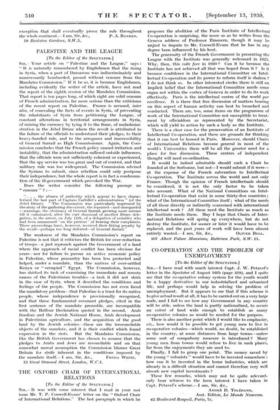THE OXFORD CHAIR OF INTERNATIONAL RELATIONS
[To the Editor of the SraCrAToR.j
Sin,—It was with some interest that I read in your last issue Mr. T. P. Conwell-Evans' letter on the " Oxford Chair of International Relations." The last paragraph in which he
proposes the abolition of the Paris Institute of Intellectual Co-operation is surprising, the more so as he writes from the Geneva address of Professor ZiMmem, though it may be unjust to impute to Mr. Conwell-Evans that he has in any degree been influenced by his host.
The generosity of the French Government in presenting the League with the Institute was generally welcomed in 1925. Why, then, this voile face in 1930? Can ft be because the Institute has not achieved all that was hoped from it ? Is it because confidence in the International Committee on Intel- lectual Co-operation and its power to reform itself is shaken ? I do not think so. In other interested circles there is still an implicit belief that the International Committee needs some organ not within the vortex of Geneva in order to do its work effectively. Paris is the intellectual centre of the world par excellence. It is there that free discussion of matters hearing on this aspect of human activity can best be broached and conducted. There are, too, some items on the programme of work of the International Committee not susceptible to treat- ment by officialdom as represented by the Secretariat, which will yield to action by such a body as the Institute.
There is a clear case for the preservation of an Institute of Intellectual Co-operation, and there are grounds for thinking that it can best be housed in Paris. Moreover, should Chairs of International Relations become general in most of the world's Universities there will be all the greater need for a place for free discussion. These centres of independent thought will need co-ordination.
It would be indeed admirable should such a Chair be founded at the Sorbonne, but not—I would submit if it were— at the expense of the French subvention to Intellectual Co-operation. The Institute serves the world and not only France. Though the opinion of French intellectuals should be considered, it is not the only factor to be taken into account. What of the National Committees on Intel- lectual Co-operation that exist in some thirty-five countries ; what of the International Committee itself ; what of the needs of all those directly or indirectly concerned with international intellectual work ? All these need the Institute as much as the Institute needs them. May I hope that Chairs of Inter- national Relations will spring up everywhere, but do not destroy the Institute, for sooner or later it would have to be replaced, and the past years of work will have been almost










































 Previous page
Previous page